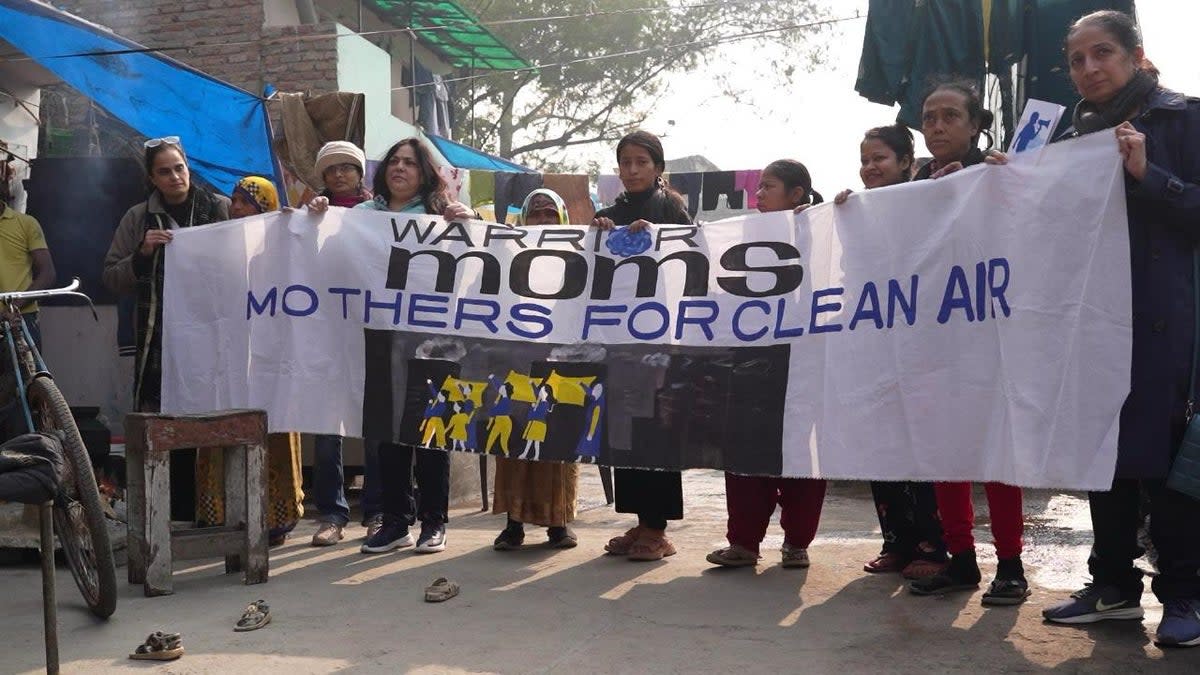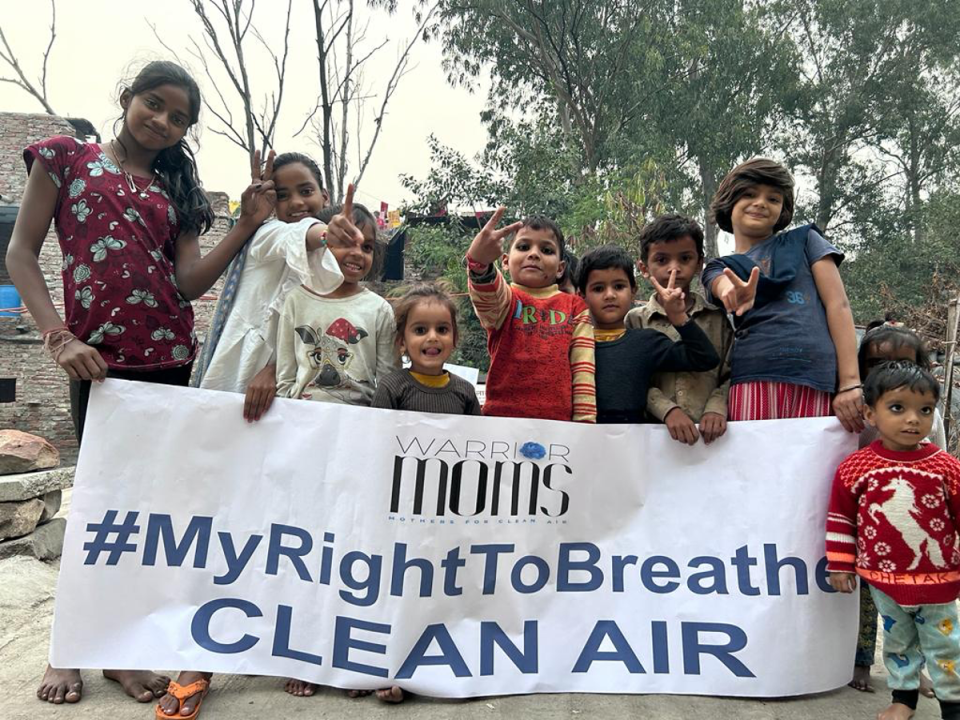Can a group of mothers in India fix the worst smog in the world?

Beneath the cloak of pollution shrouding India’s cities, a group of mothers has taken it upon themselves to shield their children from the deeply toxic air.
Calling themselves the “Warrior Moms”, the coalition of women is challenging thesocietal and governmental complacency that has allowed toxic air to become the norm.
Delhi is the world’s most polluted capital city where residents spend four months of year shrouded in smog. In winter the Air Quality Index hovers around 500 – deemed 20 times higher than the safe limit setby the World Health Organisation, and raising the risks of cancer and respiratory diseases. Scientific report after report has found how toxic air is killing millions of Indians every year and shortening their lives by over a decade.
For children in the capital and India’s other sprawling metropolises, this is particularly dangerous, leading to asthma, lung damage and cardiovascular illnesses. In Delhi, peak pollution from October to January results in schools being shut and children being confined indoors.
Bhavreen Kandhari, 51, founder of Warrior Moms, told The Independent that she wants people to demand that clean air is a priority issue from every politician who comes to their door to ask for votes.
“Every parent’s concern is that children must have a healthy future,” says Kandhari, who lives in Delhi and has two grown-up daughters. “But it is not going to become an electoral issue till you demand it.
“We are asking people that any politician who comes to you for votes, ask them where clean air on your list, and make them take a pledge that clean air should be part of your manifesto.”
Kandhari says one of her worst realisations as a mother is that tens of thousands of children in Delhi are suffering. A 2021 study found that every third child in Delhi has damaged lungs.
“The damage has been done for children’s lungs, their health and their future, [it’s] something that is irreversible. Every person cannot go and change lungs in their lives,” she added.

“My daughters, they’re 20 years old. I have been working on clean clean air for longer than that but I gave them damaged lungs. So is it acceptable? No!”
The Warrior Moms’ campaign has taken on new urgency as India gets ready to head to the ballot box in May’s national elections.
Prime minister Narendra Modi’s government launched the National Clean Air Programme (NCAP) in 2019, with the promise to reduce the dangerous particulate matter (PM) levels by 20-30 per cent in at least 102 cities across the country by 2024. But a 2022 report by Urban Lab said there is “barely any difference” in PM levels between the group of cities under the programme and those outside its ambit.
During peak pollution days, the Delhi government launches mitigation measures like reducing the cars to half and has spent millions of dollars on technical solutions likesmog tower, which scientists have called a hoax.
Yet while the Modi government has made climate change its focal point internationally, air pollution at home rarely gets the political attention it deserves.
To that end, the mothers are bringing it to the forefront running outreach programmes with residents in Delhi’s crowded localitiesto raise awareness on air pollution.
Since the organisation started four years ago, they have organised protests at Delhi’s India Gate, and helped people bring complaints to their local authorities about waste management, burning of toxic materials and other violations of environmental laws.
“We encourage the mothers, we empower them to understand laws,” says Kandhari.
“People often don’t know what to do, every city and state has different laws, different ways of complaining, they have different numbers, different emails, so we make simple SOPs for different cities,” she adds.
Kandhari emphasises that air pollution is a “serious equity issue”. While richer households can afford air purifiers, poorer families struggle to affordclean energy sources like gas cylinders for cooking and they are left to burn wood or use harmful biomass.
It means that poorer households, that do not have cooking gas pipelines or cylinders for liquid gas, can be leftwith worse air quality inside their homes than the smog outside.

“Since Covid, cylinder prices have gone up very high. Even for people who had subsidized cylinders, it’s become a decoration piece because they don’t have money to refill it,” she said.
“We started asking people how many visits they were doing approximately to the doctor. If they’re doing 15 visits, we tell them the money you will be spending and if you fall sick you will lose out on daily wages,” she says.
She added: “We think that air is the same everywhere but the ones who are living in vulnerable situations are more prone to lung disorders and they don’t have the resources to cure it. So they suffer but they don’t realize it.”
One of her biggest ambitions for Warrior Moms is to expand beyond wealthy communities, and reach poorer neighbourhoods, she said.
Kandhari, an environmental activist for over two decades, started Warrior Moms online during the Covid lockdown in 2020, the rare, brief period that Delhi’s skyline was free of smog.
“It was the world’s largest experiment. It showed that to work on pollution, you need to work on emissions,” she said. “As a parent I wanted a group to come together.”
It was also a desperate move to unite with others and draw strength from them in what otherwise was a very “lonely battle”, she said.
“You’re fighting even in your own colony [neighbourhood] where you stay, you become the bad person because you’re saving trees, you are speaking against the waste being mixed, you’re fighting with the authorities,” she said.
“You’re treated like a troublemaker. So when you join each other like the Warrior Moms kind of movement, you get power because you can support each other.”

Kandhari says she started posting about the changes she was seeing in air quality on X, previously known as Twitter. Soon she
Soon, women from across India were sharing their concerns in posts with her and reached out to Kandhari to join her, leading to the formation of Warrior Moms.
‘I saw mothers joining from Hyderabad and Punjab and Pune, places you don’t associate with bad air, so we just started joining hands and that’s how we decided to launch this,” she said.
“Every mom who joined had a story. It’s a very organic movement.”
Most of these mothers have come in touch with each other through social media, and they continue to expand the network within their cities.
Samita Kaur, a “Warrior Mom” who has been campaigning against single-use plastics and poor waste disposal in Punjab province, says she is also worried about worsening air quality.
“We don’t see clear blue skies anymore,” she said.“Air pollution is something every citizen of Punjabi acknowledges but sadly not much action is taken against the culprits [those who violate laws].”
Shaheen Tarannum lives in the eastern city of Cuttack in Odisha state, which is hardly ever seen as one of the country’s most polluted cities - but certain pockets of town have air as bad as metros, and yet the issue of terrible air quality is largely ignored.
Tarannum lives next to a waste dumping ground where air quality reaches the 150-200 range which is dangerous for her two toddlers and others.
She has filed lawsuits against companies dumping toxic waste in her area, and has campaigned to bring awareness among residents.
She told The Independent that she had watched her six-month-old nephew have an asthma attack, making her even more determined to create a better environment for her children and the community.
“I have seen him [her nephew] daily fighting with asthma. He will not sleep, he will need inhalers and medicines. So it made my mind,” she said.
She says children living close to the dumping ground frequently fall sick.
“They catch colds and allergies. People don’t realise it is connected to air pollution,” she said. She won’t take her children to visit her parents’ home because of the smoke emitted from the nearby wasteland.
“I was unable to visit my parents because if I stay back sometimes my children become sick,” she says.
But despite a clear health concern, Tarrannum says it is not easy to mobilise people behind the cause. In her decade-long struggle to educate people about the dangers of toxic air, she has faced rejections, threats and apathy. Challenging the factories that dump waste, but also provide jobs, has landed her in trouble frequently.
“The people residing in nearby areas are not educated and living below the poverty line,” she added. “Most of them work in factories that dump waste on the grounds.”
But she says as a mother she is determined, not just for her own children but for everyone else.
“If I can do a small thing for them, it will make the other people children’s also feel comfortable. Because giving education, infrastructure or schooling is not enough. I think a good environment is also necessary.”


